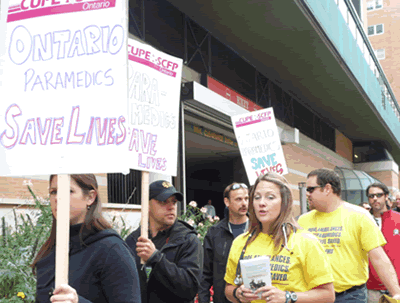Please Click Here to find recent news, events and information from CUPE Ontario.
 Nearly 100 CUPE paramedics from across Ontario attending their annual conference rallied in Toronto’s hospital district on Monday, September 19, 2011, to raise awareness of the key issues jeopardizing emergency medical services (EMS) province-wide: too few paramedics and ambulances, too few hospital beds and the use of untrained personnel. The rally wound its way to Toronto city hall where CUPE Ontario secretary-treasurer and CUPE 416 president Mark Ferguson (himself a paramedic) joined the group in the square.
Nearly 100 CUPE paramedics from across Ontario attending their annual conference rallied in Toronto’s hospital district on Monday, September 19, 2011, to raise awareness of the key issues jeopardizing emergency medical services (EMS) province-wide: too few paramedics and ambulances, too few hospital beds and the use of untrained personnel. The rally wound its way to Toronto city hall where CUPE Ontario secretary-treasurer and CUPE 416 president Mark Ferguson (himself a paramedic) joined the group in the square.
Speaking to media covering the rally, Ontario ambulance committee chair Sandra Hynds and a GTA Advanced Care Paramedic said that paramedics are professionals who save lives and that provincial underfunding for EMS compromises safety for Ontarians.
CUPE paramedics want political parties vying for election on October 6 to pay more attention to increasing call volume and to ambulance and paramedic shortages that are putting new stresses on Ontario’s emergency services. More than 18,000 hospital beds have been cut, and bed occupancy rates are exceptionally high, causing Ontario emergency rooms to overflow. After the election health care funding plans suggest that these problems will get much worse. “We are urging voters to consider this carefully when they vote—to ask their local candidate to commit to no cutbacks in health care services and that only fully-qualified paramedics be used to provide emergency medical services,” said Hynds.
Paramedics undergo extensive training and certification to ensure quick intervention to treat and stabilize people in crisis at the scene and to get them to hospital for further care. In the past, the former Conservative government, which included current leader Tim Hudak, replaced highly-skilled paramedics with less-skilled staff in order to cut emergency service costs.
“The care and safety of Ontarians is being compromised, and the situation will get worse if highly-skilled paramedics are replaced with less-skilled responders in the name of cost-cutting,” said Hynds.
